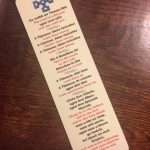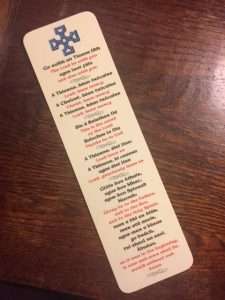Loss of language
Advocates of the Irish language in the diocese have produced a bookmark that has been circulated to the clergy, it is printed with key phrases from the liturgy. It is suggested that it might be used to introduce Irish to Sunday worship. It is a commendable effort, the problem comes with those of us who have little idea as to how words are pronounced and whose congregations would have little idea of how to respond.
I would be pleased to be able to read the bookmark. I have a Duolingo App on my iPhone with Irish included, but struggle with even basic phrases. When we moved to Dublin from Northern Ireland in 1999, there seemed no opportunities for newcomers to learn what was presented as the first national language. There seemed no provision for those who had not learned Irish from primary school onward. Unlike those who who would dismiss the language as an expensive and futile luxury, I believe the loss of language is more than just the loss of a cultural artifact.
Back in the early 1980s, a friend in college was from North Wales. He had been a monoglot Welsh speaker until the age of 14. His family had lived on a peninsula and they had no television. Primary and secondary schools had been Welsh speaking. In a reverse of what had happened in previous generations, he remembered with anger a teacher who had repeatedly mocked an English speaking pupil. He had come to Dublin expecting a place as Celtic as the Wales he had left. Wales was under English rule; Ireland had been independent for sixty years, time enough to secure language and culture. He was disappointed at what he found; Dublin had been infected by what he called “plastic American Euro-culture.” He would have been dismayed at Ireland that developed in the decades that followed. He would have felt that his “plastic American Euro-culture” hadn’t just infected the country, it had colonised almost everywhere.
There would be people I knew in the North who would be delighted at the loss of language; I can hear a bitter woman I once knew talking about, “them ones down there an’ their silly language.” As a Christian, I think the loss of the Irish language is a serious matter. The plastic American Euro-culture that my Welsh friend so much disliked is mediated through the English language – Mammon speaks English! The Irish language is a bulwark against the globalised materialism of the mass media and multinationals. Perhaps there aren’t many people who would want to return to the vision of Ireland articulated in de Valera’s 1943 Saint Patrick’s Day address, but does anyone really want a country entirely devoid of character where leisure time is spent in shopping malls and where identity is solely perceived in what you have and what you can buy?
Irish is a defence against a world where McDonald’s counts a cuisine and where Soaps count as culture. Can anyone teach me the words on the bookmark?



Well they sure as shootin could’ve helped you along by ‘not’ using the Insular majuscule.
It actually not that difficult. The word for Lord (Tiarna, or sometimes Thiarna) can be heard in the sung Kyrie on youtube ”A Thiarna dean trocaire lyrics”.
Amen is Greek, and trying to crowbar it into Irish is pointless on levels that’s hard to rise too.
———————————————————-
The T is pronounced soft, almost silent. So the word sound like the English “Hear”, only softer and longer, the the ‘na’ is as you’d expect.
The first line, the call, is, ‘go rev a Hear-na liv’
Answer. Augus lathe féin
Agus, is Et in Latin, And in Eng. Sounded like Aug-gus or pretty close to the month, August, without the final T.
Leat, is as the ‘lathe’ and plaster. Féin as in well you know who.
====================================
The Kyria
A Thiarna déan trocaire (Thiarna, as above but with more sound on the H. And with two words [A Thiarna]. You might say the first ‘A’ is the call to attract the attention of the Lord. It goes back to the Greek, Oy Zeus, and repurposed. Hardly a shock really.
Déan. Largely like rain but with a D.
Trocaire, as in the box.
A Chriost déan trocaire
Chriost, as in the Greek without the final ‘ós’
A Thiarna déan trocaire
A Chriost déan trocaire
============================
I’ll get back on the rest later.
I shall print this off!
I can’t read the bit above ‘this is the word of the Lord’. And I’ve pulled it into Photoshop and I still can’t read it. There’s something about the angle and the lack of resolution on that line.
I’m assuming it’s ‘Sin é Briathar Dé’ . Try this, ww,dot, focloir.ie/en/dictionary/ei/verb for Briathar. In the page the M C and U are the Munster, Galway and Ulster pronounciations, just fill in the needful for I believe your settings will block live links.
Either way, Dé is God, not Lord.
Next: Buíochas le Dia. Bwee-o-chas (Chas, as in Castra). Le, as you would. Dia, dee-a.
=======================================================================
Can you shoot the bottom of it and send it to the mail that sits above the comment.
I can remember when I was in NZ a certain amount was said in Maori, despite the congregation being all white.
Last week at the OIreachtas, an Irish language festival, there was a COI event, I think we need to accept the language as ours too.
Classes of course are the best way to learn a language but Teanglann.ie has phonetics.
I think the Government should end its ambivalence, either Irish is the first national language or it is not, if it is, then it should be properly resourced.